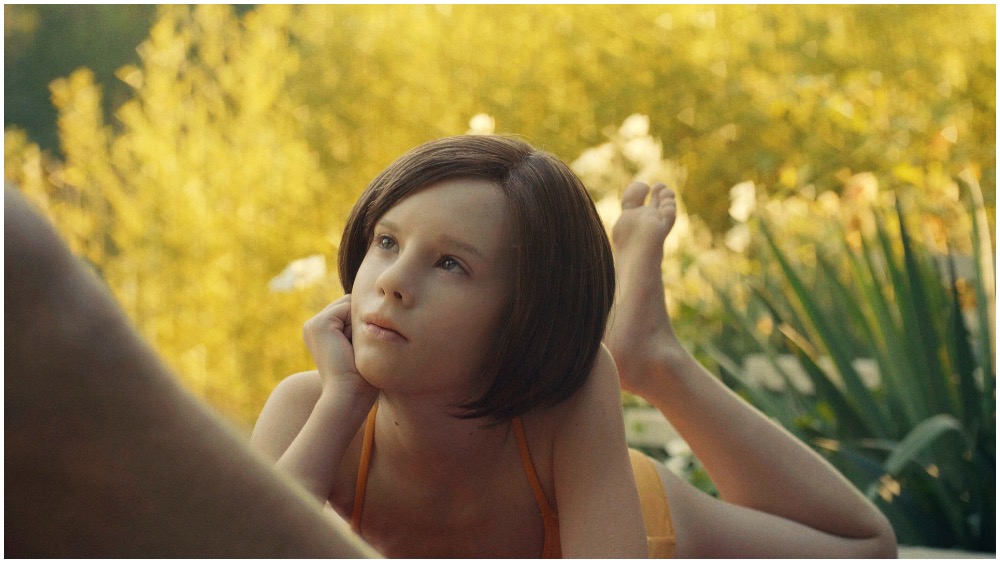Sandra Wollner on Berlin A.I. Drama ‘The Trouble With Being Born’
By Christopher Vourlias
LOS ANGELES (Variety.com) – At first glance Elli appears to be a normal young girl living with her single father, spending idle afternoons lazing by a sunlit pool. But a disturbing reality is soon revealed: Elli is actually an android whose memories were programmed by the man she lovingly calls “Daddy.” Before long the true nature of their relationship becomes apparent, until the night Elli sets off to follow a ghostly echo into the woods.
“The Trouble With Being Born” is the unsettling second feature from Austrian director Susan Wollner, who won the German Film Critics’ Award in 2019 for “The Impossible Picture.” An eerie, metaphysical exploration of the identities we create for ourselves, and how they can come unraveled, pic plays in the Encounters section of the Berlin Film Festival.
Wollner spoke to Variety the morning after the world premiere about the isolation of living in a world that’s growing increasingly virtual. She also discussed the difficult decision to cast a 10-year-old actor [the pseudonymous Lena Watson] for the lead role, and how she expects viewers to react to her provocative sophomore feature. “The audience were very welcoming [on opening night],” she said. “We’re thinking that there will be some divided opinions on the film. We never expected anything else.”
You recently talked about this film as an “anti-Pinocchio,” and a departure from movies like Steven Spielberg’s “A.I.,” in which the main characters dream of becoming human. Were those reference points for “The Trouble With Being Born,” or did it start somewhere else?
It was Roderick Warich, my co-author, who had the initial idea to do a film about a childlike android with this man, and this relationship. I immediately jumped onto that, because I just found it so interesting and intriguing to tell the story out of the point of view of this android who does not care, who does not want anything but what it’s programmed to want. To not tell the story of becoming a human, or a wooden [puppet] who wants to become a boy, but just wants what we want it to do. For me, it’s more about the “virtuality” of our own conversations, of our own reality, of our own loss and being on our own, “ghost in a shell,” in a way.
Elli functions almost like a mirror for the other characters, reflecting their desires, their traumas, and also their deep isolation. Do you think there’s something inherently alienating about all our lives, and that these characters represent our own need to project our longings and fears onto others?
I don’t think that this is a zeitgeist thing. This is something that always was there, that we always have to challenge ourselves to step out of the shell and into this world, that we are always thrown back to the ghosts we’ve always been. [The fact] that we’re becoming more and more virtual only reflects this part of us. It underlines it, of course, but I don’t think it’s only because we’re becoming more virtual. Couldn’t it also be that it just shows the isolation that always was there?
You initially planned to cast a 20-year-old actor as Elli, because of the sexual relationship that is implied between her and the man she lives with. Why did you change your mind and decide to use a 10-year-old actor for that role?
The original idea always was to have the child robot. [It was a question of] how we were going to cast, and how we were going to shoot it. Jana McKinnon is an actress I already worked with, and I had her in mind. She looks very young, but of course she’s already a young woman. I [knew I could] pretend that she was a child, which is obviously not the way to go. I was a little scared to shoot it with a child. It took me awhile, this process. But it stuck with me, and at one point it just felt wrong to not do it. We then changed some of the scenes, took some more explicit stuff out. But we always wanted it to be a child. I was just afraid, and I needed some process to come there.
You used a silicone mask for narrative purposes, but it served a dual role.
The good thing about that was that Lena’s identity would be covered. Nobody recognizes her. We really thought about that a lot. But also, it’s a role she’s playing. She wants to be an actress—she is an actress. Of course, her parents were there during the shoot. She was never naked, she was never running around naked, she never saw anybody naked on set. We just did that in the edit.
What was it like working with her on set and preparing her for the role?
We were so lucky to have met her. We were so glad to meet her family, who were a super healthy family that talks about everything very openly. I met them in the very beginning, and I talked to Lena the first time I met her in a child-appropriate way about what this film is about. She understood.

